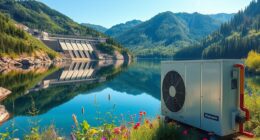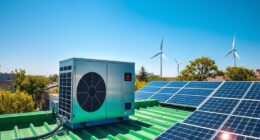Did you know that increasing the effectiveness of your heat pump could reduce your energy costs by up to 20%?
In this interactive guide, we will show you how to maximize the performance of your heat pump for optimal savings.
From understanding thermal energy transfer to utilizing advanced technologies, we will provide you with expert tips and tricks to boost your heat pump efficiency.
Get ready to save money and serve the environment with our comprehensive guide.

Key Takeaways
- Understanding thermal energy transfer mechanisms: conduction and convection
- Importance of choosing the right heat pump for maximum efficiency, considering factors like proper sizing, efficiency ratings, energy source, brand reputation, and professional installation
- Optimizing heat pump sizing for enhanced performance by using a heat pump sizing calculator and avoiding the consequences of oversized or undersized units
- Ensuring proper insulation for heat pump efficiency, including the advantages of different insulation types, the benefits of high-quality insulation for heat retention, and the importance of sealing air leaks
Understanding Thermal Energy Transfer in Heat Pumps
We can enhance our understanding of thermal energy transfer in heat pumps by exploring the key principles and processes involved.
Thermal energy transfer mechanisms play a crucial role in the efficiency of heat pumps. The two main mechanisms are conduction and convection.
Conduction involves the transfer of heat through direct contact between materials, while convection occurs when heat is transferred through the movement of fluids or gases.
Additionally, there are several factors that affect the efficiency of a heat pump. These include the type and quality of insulation, the size and design of the heat exchanger, and the overall system maintenance.

Choosing the Right Heat Pump for Maximum Efficiency
To ensure maximum efficiency, we need to carefully select and install the right heat pump for our specific heating and cooling needs. When it comes to heat pump installation, there are a few key factors to consider. Here are some guidelines to help you choose the most energy efficient model for your home:
-
Size: Make sure the heat pump is properly sized for your space. A unit that’s too small will struggle to heat or cool effectively, while an oversized unit may cycle on and off frequently, wasting energy.
-
Efficiency rating: Look for heat pumps with high SEER (Seasonal Energy Efficiency Ratio) and HSPF (Heating Seasonal Performance Factor) ratings. These indicate how efficiently the unit operates.
-
Energy source: Consider whether a ground source or air source heat pump is more suitable for your location and climate.

-
Brand reputation: Research reputable brands known for producing reliable and energy efficient heat pumps.
-
Professional installation: Trust a qualified HVAC professional to install your heat pump correctly, ensuring optimal performance and efficiency.
Optimizing Heat Pump Sizing for Enhanced Performance
Optimizing heat pump sizing is essential for enhancing performance and maximizing efficiency. Properly sizing your heat pump ensures that it can effectively heat or cool your space without wasting energy.
To determine the right size for your heat pump, you can use a heat pump sizing calculator. This tool takes into account factors such as the size of your home, insulation levels, climate, and desired indoor temperature to determine the appropriate size for your heat pump.

It’s important to note that oversized heat pumps can lead to short cycling, reduced energy efficiency, and increased wear and tear on the system. On the other hand, undersized heat pumps may struggle to adequately heat or cool your space, resulting in discomfort.
Ensuring Proper Insulation for Heat Pump Efficiency
When it comes to ensuring proper insulation for heat pump efficiency, understanding different insulation types and their benefits is key.
We’ll discuss the advantages of common insulation materials such as fiberglass, cellulose, and spray foam, and how they can improve heat retention in your home.
Additionally, we’ll provide DIY insulation tips for those who prefer a hands-on approach, as well as highlight the benefits of hiring a professional insulation service for optimal results.

Insulation Types and Benefits
We recommend using high-quality insulation to maximize our heat pump’s efficiency. Proper insulation is crucial for ensuring that the heat generated by the pump stays inside our homes, keeping us warm and comfortable. Here are some types of insulation materials and their benefits:
- Fiberglass: Offers good thermal performance and is cost-effective.
- Cellulose: Made from recycled materials, it provides excellent insulation and has a low environmental impact.
- Spray foam: Provides superior insulation and air sealing properties.
- Reflective insulation: Used in attics and walls to reflect heat away from the home during summer.
- Rigid foam: Highly effective in insulating foundations and basement walls.
When it comes to insulation installation, it’s important to hire professionals who have the knowledge and experience to ensure proper installation. This will maximize the effectiveness of the insulation and ultimately improve the efficiency of our heat pump.
DIY Insulation Tips
Our top priority is to ensure that our heat pump operates efficiently. One way we can achieve this is by implementing proper insulation.
DIY insulation techniques can help us optimize our home’s energy efficiency and reduce heat loss or gain.

When it comes to home insulation materials, there are several options available.
One popular choice is fiberglass insulation, which is affordable and easy to install.
Another option is cellulose insulation, made from recycled materials, which provides excellent thermal performance.
Spray foam insulation is also effective, as it creates an airtight seal, preventing drafts and reducing energy waste.

Additionally, sealing air leaks around windows, doors, and electrical outlets can significantly improve insulation.
Hiring Professional Insulation
To maximize our heat pump efficiency, it’s essential to regularly hire professional insulation services. Proper insulation is crucial for ensuring that our heat pump operates at its highest efficiency and reduces energy waste. When it comes to professional installation, there are a few key factors to consider:
- Expertise: Professional insulation contractors have the knowledge and experience to assess our home’s insulation needs accurately.
- Quality Materials: They use high-quality insulation materials that are specifically designed for optimal energy efficiency.
- Proper Installation: Professionals ensure that insulation is installed correctly, leaving no gaps or areas for heat to escape.
- Energy Savings: By having professional insulation, we can significantly reduce our energy bills and improve the overall comfort of our home.
- Long-term Benefits: Professional insulation helps prolong the lifespan of our heat pump and prevents potential issues in the future.
By investing in professional insulation, we can create a more energy-efficient home and maximize the performance of our heat pump.
Now, let’s explore another important aspect of increasing our heat pump efficiency: implementing smart thermostat technology for energy savings.
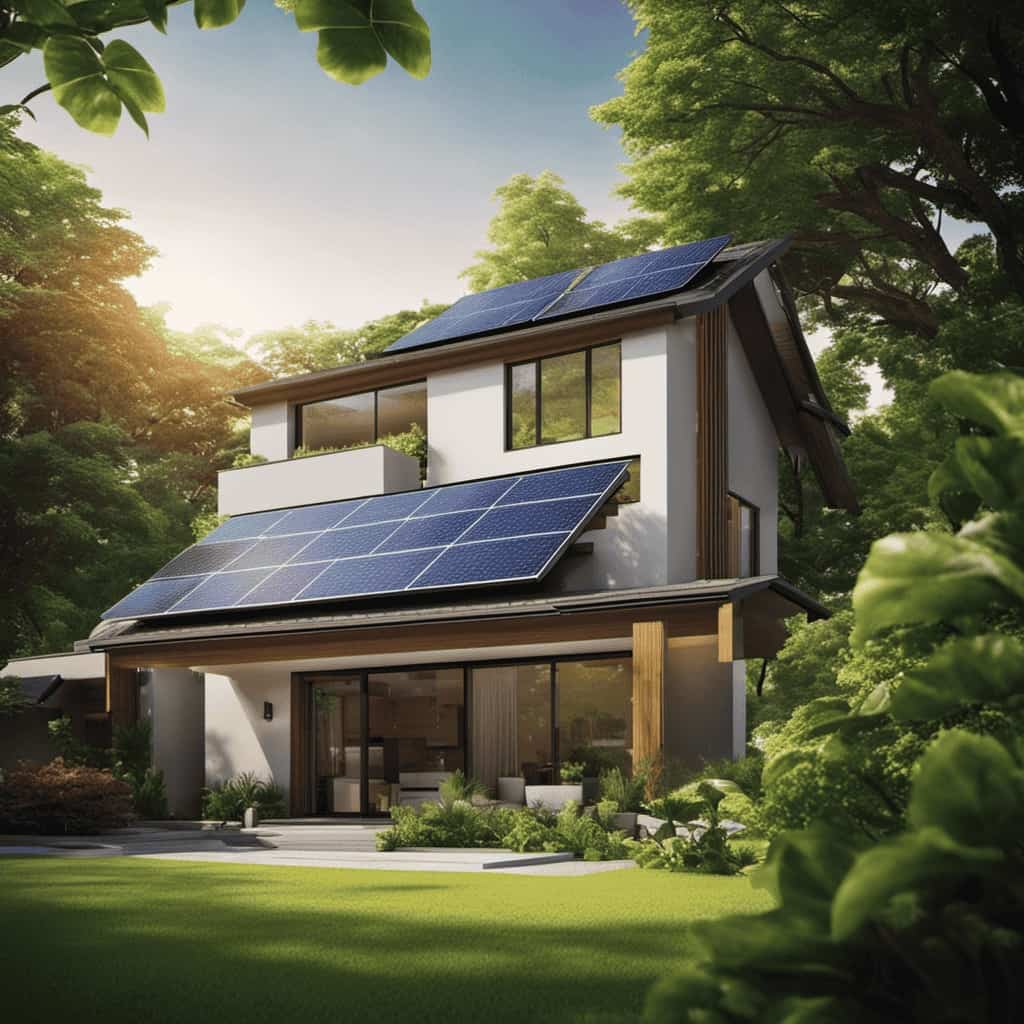
Implementing Smart Thermostat Technology for Energy Savings
Implementing smart thermostat technology can significantly improve the efficiency of your heat pump system.
Smart thermostats offer a range of benefits, including energy-saving features that can help reduce your energy consumption and lower your utility bills.
These thermostats are also cost-effective to install, making them a smart investment for homeowners looking to optimize their heat pump’s performance.
Benefits of Smart Thermostats
Smart thermostats offer numerous benefits, including significant energy savings and improved home comfort. By implementing smart thermostat technology, homeowners can take advantage of energy-saving features and experience the cost effectiveness of installation.
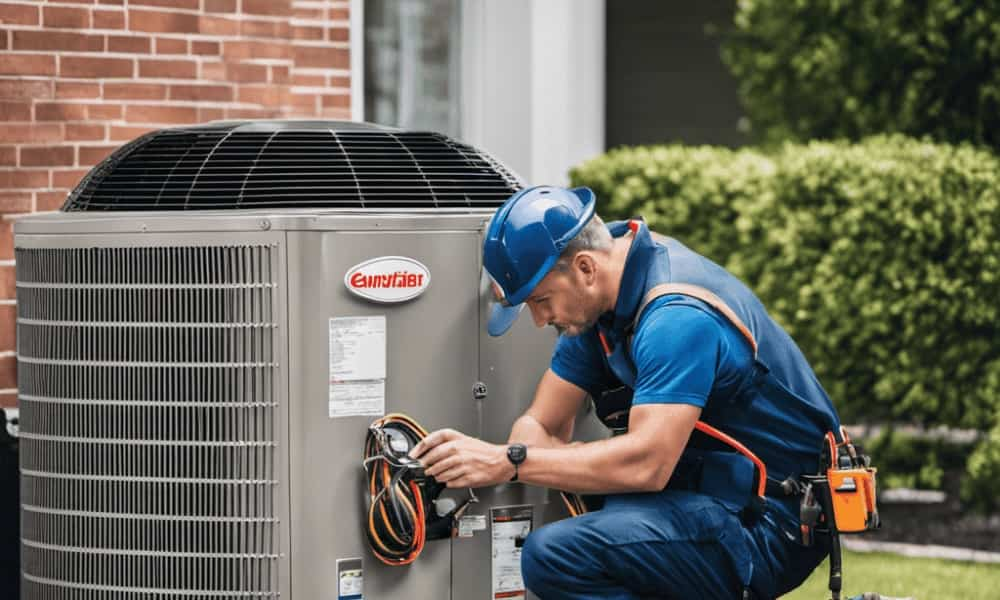
Here are five reasons why smart thermostats are a valuable addition to any home:
-
Energy efficiency: Smart thermostats use advanced algorithms to optimize temperature settings, reducing energy consumption and lowering utility bills.
-
Remote control: With a smart thermostat, you can adjust the temperature of your home from anywhere using your smartphone or tablet, ensuring comfort and energy savings even when you’re away.
-
Learning capabilities: These thermostats learn your schedule and preferences, automatically adjusting the temperature to maximize comfort and minimize energy usage.

-
Integration with smart home systems: Smart thermostats can be linked to other smart home devices, allowing for seamless automation and control.
-
Energy usage insights: Smart thermostats provide detailed energy usage reports, empowering homeowners to make informed decisions about their energy consumption.
Implementing a smart thermostat can greatly improve energy efficiency and enhance the overall comfort of your home, making it a wise investment for both your wallet and the environment.
Energy-Saving Features
By utilizing energy-saving features of smart thermostat technology, we can optimize our heat pump efficiency and reduce energy consumption. Smart thermostats offer a range of benefits that contribute to energy savings.

One of the key advantages is the ability to schedule temperature changes based on our daily routines. This means that the heat pump will only operate when needed, resulting in significant energy savings.
Additionally, smart thermostats can learn our preferences over time and adjust the heating and cooling settings accordingly. This ensures that our home is always comfortable without wasting energy.
Moreover, smart thermostats can be integrated with other smart home devices, such as sensors and occupancy detectors, to further enhance energy efficiency.
Cost-Effectiveness of Installation
Installing a smart thermostat for energy savings can be a cost-effective solution for improving heat pump efficiency. By implementing smart thermostat technology, you can optimize your heating and cooling system, saving both energy and money. Here are five key benefits of installing a smart thermostat:
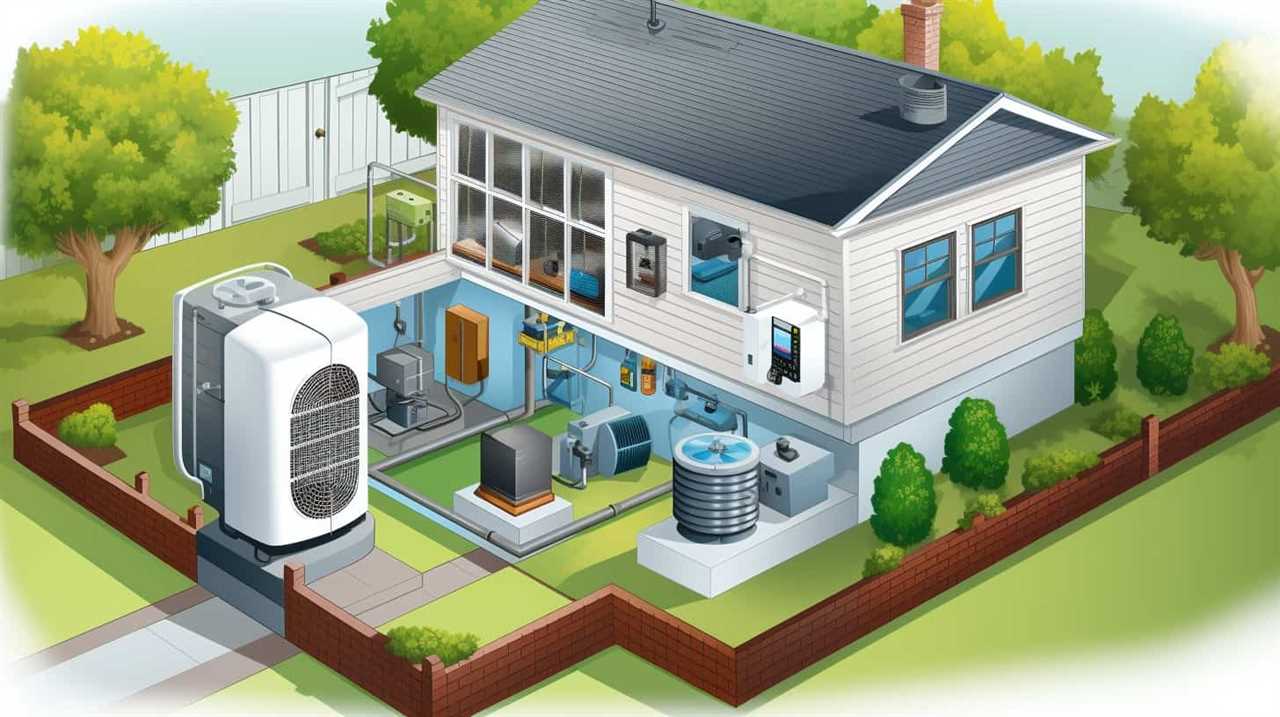
-
Energy savings: A smart thermostat allows you to set temperature schedules and adjust settings remotely, ensuring that you only use energy when needed.
-
Increased comfort: With a smart thermostat, you can customize temperature settings to suit your preferences, ensuring a comfortable living environment.
-
Improved efficiency: Smart thermostats continuously learn your heating and cooling patterns, automatically adjusting settings to maximize efficiency.
-
Remote control: With smartphone integration, you can control your thermostat from anywhere, allowing you to make adjustments even when you’re not at home.

-
Return on investment: While the initial cost of a smart thermostat may be higher, the energy savings and increased efficiency can lead to significant long-term savings, providing a positive return on investment.
Implementing a smart thermostat is a practical and rewarding energy-saving tip that can help you achieve better heat pump efficiency and save money in the long run.
Regular Maintenance for Improved Heat Pump Efficiency
Regular maintenance is essential for improving the efficiency of our heat pump. By regularly inspecting and servicing our heat pump, we can ensure that it operates at its optimal performance, saving us energy and money in the long run. To help you stay on top of your heat pump maintenance, here is a regular maintenance checklist:
| Maintenance Task | Frequency | Benefits |
|---|---|---|
| Clean or replace air filters | Every 1-3 months | Improves air quality and efficiency |
| Check and clean outdoor coils | Twice a year (spring and fall) | Prevents dirt buildup and enhances heat transfer |
| Inspect and lubricate fan motor | Annually | Extends lifespan and reduces energy usage |
| Check refrigerant levels | Annually | Ensures proper heat exchange and efficiency |
| Test thermostat accuracy | Annually | Avoids temperature discrepancies and energy waste |
Exploring Geothermal Heat Pump Options for Greater Efficiency
Let’s take a closer look at the geothermal heat pump options available to us for achieving greater efficiency. When it comes to geothermal heat pump installation, there are several options to consider.

Here are some benefits of choosing geothermal heat pumps:
- Energy efficiency: Geothermal heat pumps are highly efficient and can save you up to 50% on your energy bills.
- Environmental friendliness: These systems use the constant temperature of the earth to heat and cool your home, reducing your carbon footprint.
- Long lifespan: Geothermal heat pumps can last up to 25 years, providing you with reliable and consistent heating and cooling.
- Quiet operation: Unlike traditional HVAC systems, geothermal heat pumps operate quietly, creating a more peaceful and comfortable environment.
- Low maintenance: With fewer moving parts, geothermal heat pumps require less maintenance, saving you time and money.
Utilizing Solar Energy to Boost Heat Pump Efficiency
To maximize our heat pump efficiency, we can enhance it by utilizing solar energy through harnessing the power of the sun. Solar panel integration is a great way to achieve this.
By installing solar panels on the roof or in the yard, we can generate electricity from sunlight and use it to power our heat pump. This reduces our dependence on the electrical grid and helps to lower our energy bills.
In addition, heat pump hybrid systems can be used to combine the power of solar energy with traditional heating methods. These systems use solar energy during the day and switch to a backup heating source at night or during periods of low sunlight.

This integration of solar energy into our heat pump system improves efficiency and reduces our carbon footprint.
Evaluating Advanced Heat Pump Technologies for Optimal Performance
We can assess the effectiveness of various advanced heat pump technologies to achieve optimal performance. When evaluating heat pump performance, it’s important to consider the following advanced technologies:
- Variable-speed compressors: These compressors allow for more precise temperature control and greater energy efficiency.
- Enhanced coil design: Coils with improved heat transfer capabilities maximize the heat pump’s performance.
- Intelligent controls: Smart controls optimize system operation by adjusting settings based on weather conditions and occupancy patterns.
- Two-stage compressors: These compressors provide better efficiency by adjusting the capacity according to the heating or cooling demand.
- Heat recovery systems: These systems capture waste heat from the cooling process and use it for water heating or other purposes, increasing overall energy efficiency.
Frequently Asked Questions
How Does the Understanding of Thermal Energy Transfer in Heat Pumps Affect the Efficiency of My Heat Pump?
Understanding thermal energy transfer is key to heat pump efficiency. It directly impacts the performance of your heat pump. By comprehending how thermal energy is transferred, you can optimize your system for maximum efficiency and savings.
What Factors Should I Consider When Choosing the Right Heat Pump for Maximum Efficiency?
When choosing the right heat pump for maximum efficiency, we consider factors such as heat pump capacity and energy efficiency standards. These play a crucial role in ensuring optimal performance and cost savings.
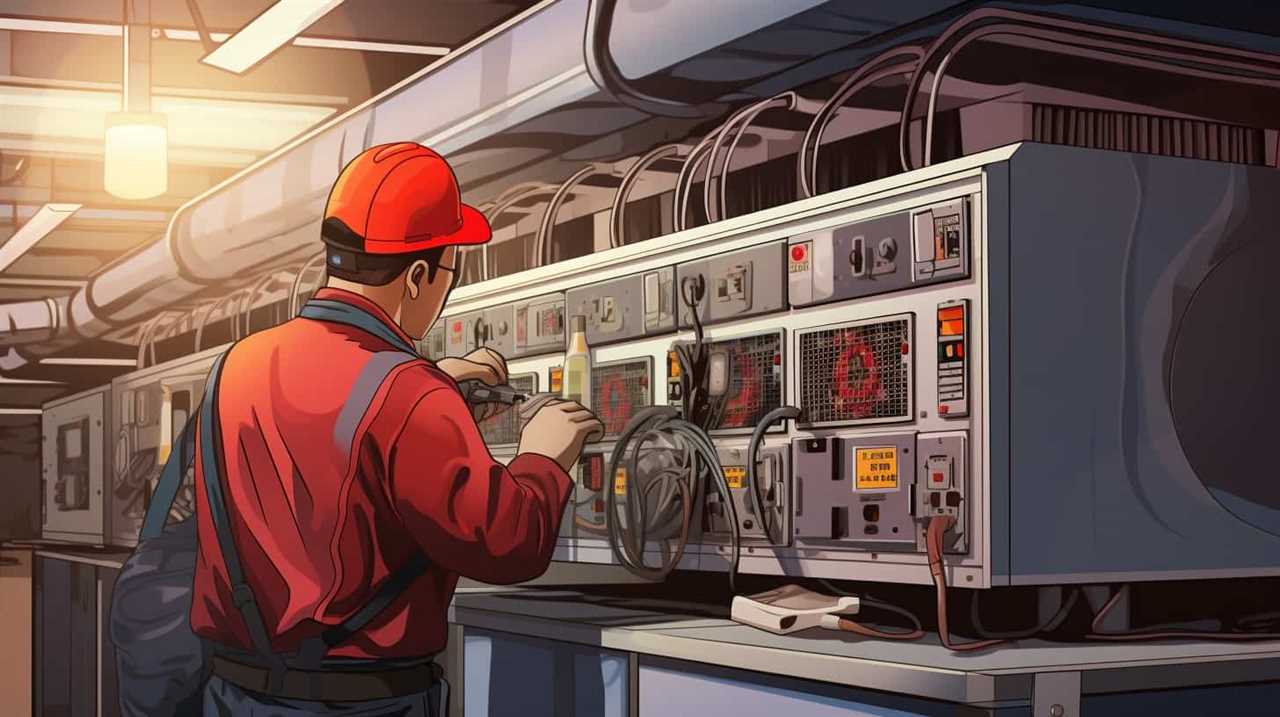
How Does Optimizing Heat Pump Sizing Enhance the Performance of the System?
Optimizing heat pump sizing is crucial for maximizing performance. Finding the right balance between cost and performance ensures efficiency. Additionally, considering the impact of climate on heat pump efficiency helps enhance system performance.
Why Is Proper Insulation Important for Heat Pump Efficiency?
Proper insulation is essential for heat pump efficiency. It helps minimize heat loss or gain, ensuring optimal performance. By using high-quality insulation materials, we can create a more efficient and comfortable indoor environment while saving energy and reducing utility costs.
How Does Implementing Smart Thermostat Technology Contribute to Energy Savings With Heat Pumps?
Implementing smart thermostat technology contributes to energy savings with heat pumps by allowing us to easily program temperature settings and adjust them remotely. This helps optimize energy usage and reduce wastage, resulting in lower utility bills and increased efficiency.
Conclusion
In conclusion, maximizing heat pump efficiency is crucial for reducing energy consumption and lowering utility costs. By understanding thermal energy transfer, choosing the right heat pump, optimizing sizing, ensuring proper insulation, implementing smart thermostat technology, and regularly maintaining the system, homeowners can significantly improve their heat pump’s performance.
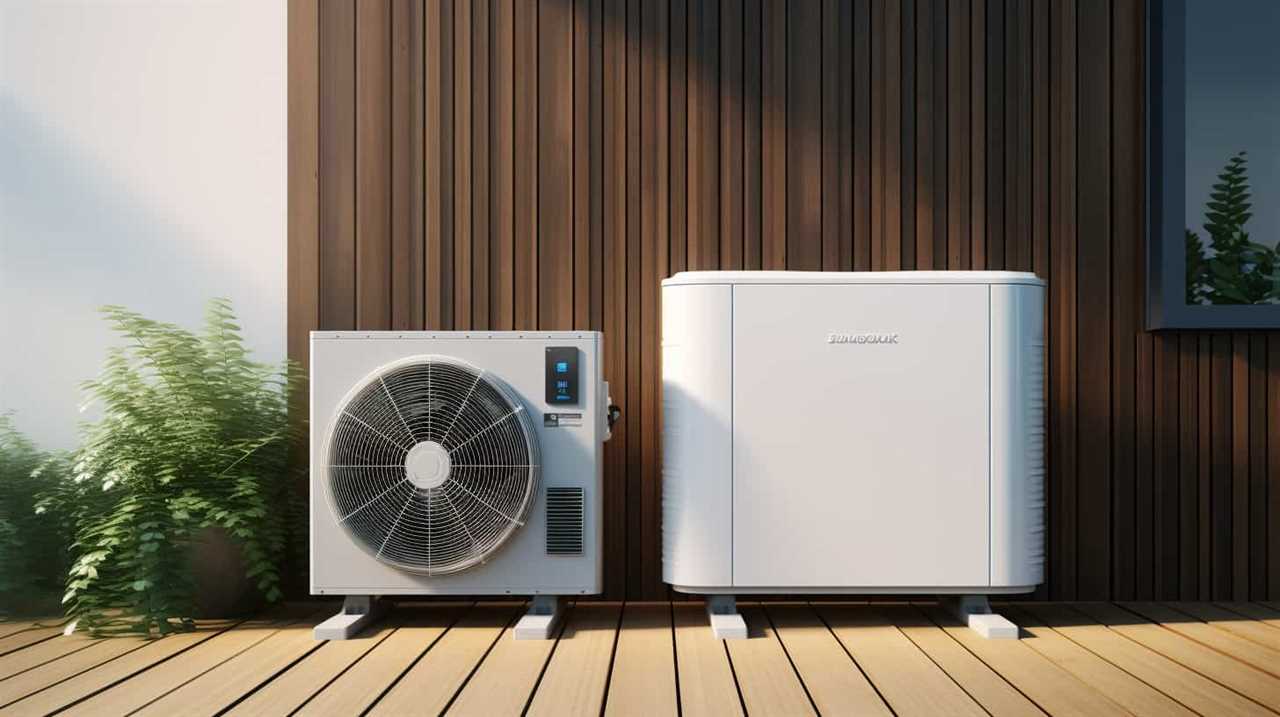
For example, a case study conducted in a residential building demonstrated that by upgrading to a high-efficiency heat pump and implementing smart thermostats, the homeowner was able to reduce their energy consumption by 30% and save $500 annually.






